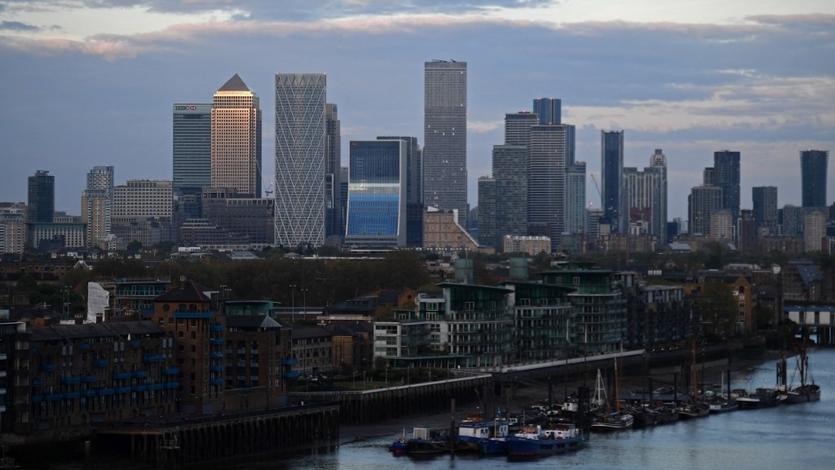 The secondary central business district of Canary Wharf is pictured as the sun sets in London on Saturday, May 8, 2021. (JUSTIN TALLIS / AFP)
The secondary central business district of Canary Wharf is pictured as the sun sets in London on Saturday, May 8, 2021. (JUSTIN TALLIS / AFP)
LONDON - Britain's economy unexpectedly shrank in April, official figures showed on Monday, adding to fears of a sharp slowdown just three days before the Bank of England announces the scale of its latest interest rate response to the surge in inflation.
Gross domestic product contracted by 0.3 percent after falling by 0.1 percent in March, the first back-to-back declines since April and March 2020, at the start of the coronavirus pandemic.
Economists polled by Reuters had on average expected GDP to grow by 0.1 percent in April from March.
GDP would have expanded by 0.1 percent excluding the impact of a reduction in the government's coronavirus test-and-trace and vaccination programs, the Office for National Statistics said.
Over the three months to April, GDP was up by 0.2 percent, weaker than the Reuters poll forecast of 0.4 percent and slowing sharply from growth of 0.8 percent in the three months to March
But it was the first time since January last year that all main economic sectors had shrunk.
Over the three months to April, GDP was up by 0.2 percent, weaker than the Reuters poll forecast of 0.4 percent and slowing sharply from growth of 0.8 percent in the three months to March.
ALSO READ: Minister: UK's new N. Ireland trade rules will not break law
Many firms said increases in the cost of production had affected their business, the ONS said.
Martin Beck, chief economic advisor to the EY ITEM Club, a forecasting group, said the data was a poor launchpad for the second quarter, which was at an increased risk of showing a small contraction across the three months.
Growth was likely to rebound in the third quarter so the chances of a second successive quarterly decline in GDP – the traditional definition of a technical recession – looked low.
"But the growth outlook is poor. An already serious squeeze on households' spending power will be negatively affected by the inflationary impact of global supply chain frictions and sterling's recent weakness," Beck said.
Sunak: It’s global
Finance minister Rishi Sunak, who last month announced extra support for households and is expected to do more later this year, said Britain was not alone in facing the hit from surging inflation.
ALSO READ: UK inflation serves up pain for Chinese restaurants
"Countries around the world are seeing slowing growth, and the UK is not immune from these challenges," he said in a statement.
Last week, however, the Organization for Economic Co-operation and Development said Britain's economy would show no growth next year.
On Monday, the Confederation of British Industry warned of stagnation and possibly a recession.
Despite the slowdown, the BoE is expected to raise interest rates for the fifth time since December on Thursday.
It has forecast inflation will exceed 10 percent in the final quarter of the year, five times its target.
Most investors and economists expect another quarter percentage-point rate hike this week, taking Bank Rate to 1.25 percent, its highest since 2009.
Economists said there was some encouraging news in Monday's GDP data including a 2.6 percent increase in consumer-facing services such as hairdressing and the grooming industry. The retail sector also grew by 1.4 percent.
But April's jump in domestic power tariffs and an increase in taxes paid by workers introduced that month are likely to squeeze living standards and the broader economy.
READ MORE: UK audit shake-up targets big firms after corporate failures
Separate trade data published by the ONS showed the impact of sanctions on Russia with exports to the country falling to the lowest monthly value since January 1999, and imports the lowest since March 2004.
With energy costs soaring, Britain imported 9.8 billion pounds of fuel goods in April alone - the highest since records began in 1997 and representing around a fifth of all goods imports.


